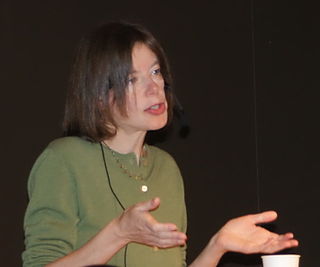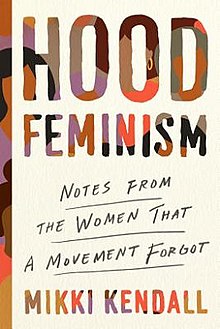
Susan Charlotte Faludi is an American feminist, journalist, and author. She won a Pulitzer Prize for Explanatory Journalism in 1991, for a report on the leveraged buyout of Safeway Stores, Inc., a report that the Pulitzer Prize committee commended for depicting the "human costs of high finance". She was also awarded the Kirkus Prize in 2016 for In the Darkroom, which was also a finalist for the 2017 Pulitzer Prize in biography.

Gloria Jean Watkins, better known by her pen name bell hooks, was an American author and social activist who was Distinguished Professor in Residence at Berea College. She is best known for her writings on race, feminism, and class. The focus of hooks's writing was to explore the intersectionality of race, capitalism, and gender, and what she described as their ability to produce and perpetuate systems of oppression and class domination. She published around 40 books, including works that ranged from essays and poetry to children's books. She published numerous scholarly articles, appeared in documentary films, and participated in public lectures. Her work addressed love, race, class, gender, art, history, sexuality, mass media, and feminism.
Second-wave feminism was a period of feminist activity that began in the early 1960s and lasted roughly two decades. It took place throughout the Western world, and aimed to increase equality for women by building on previous feminist gains.

Intersectionality is an analytical framework for understanding how aspects of a person's social and political identities combine to create different modes of discrimination and privilege. Intersectionality identifies multiple factors of advantage and disadvantage. Examples of these factors include gender, caste, sex, race, ethnicity, class, sexuality, religion, disability, weight, and physical appearance. These intersecting and overlapping social identities may be both empowering and oppressing.
Karen Karbo is an American novelist, non-fiction writer and journalist.
Feminist political theory is an area of philosophy that focuses on understanding and critiquing the way political philosophy is usually construed and on articulating how political theory might be reconstructed in a way that advances feminist concerns. Feminist political theory combines aspects of both feminist theory and political theory in order to take a feminist approach to traditional questions within political philosophy.

Who Stole Feminism? How Women Have Betrayed Women is a 1994 book about American feminism by Christina Hoff Sommers, a writer who was at that time a philosophy professor at Clark University. Sommers argues that there is a split between equity feminism and what she terms "gender feminism". Sommers contends that equity feminists seek equal legal rights for women and men, while gender feminists seek to counteract historical inequalities based on gender. Sommers argues that gender feminists have made false claims about issues such as anorexia and domestic battery and exerted a harmful influence on American college campuses. Who Stole Feminism? received wide attention for its attack on American feminism, and it was given highly polarized reviews divided between conservative and liberal commentators. Some reviewers praised the book, while others found it flawed.
White feminism is a term used to describe expressions of feminism which are perceived as focusing on white women while failing to address distinct forms of oppression faced by ethnic minority women and women lacking other privileges. The term has been used to label and criticize theories that are perceived as focusing solely on gender-based inequality. Primarily used as a derogatory label, "white feminism" is typically used to reproach a perceived failure to acknowledge and integrate the intersection of other identity attributes into a broader movement which struggles for equality on more than one front. The term has also been used to refer to feminist theories perceived to focus more specifically on the experience of white, cisgender, heterosexual, able-bodied women, and in which the experiences of women without these characteristics are excluded or marginalized. This criticism has predominantly been leveled against the first waves of feminism which were seen as centered around the empowerment of white middle-class women in Western societies.

Alana Mychal Haim is an American musician and actress. She is best known as a member of the pop rock band Haim, along with her two older sisters Este and Danielle, where she performs piano, guitar and vocals. In 2020, the band received a Grammy Award for Album of the Year nomination for their third album, Women in Music Pt. III.

Mrs. America is an American historical drama television miniseries produced by FX and originally aired on the sister streaming service FX on Hulu. Created and co-written by Davhi Waller and directed by Anna Boden and Ryan Fleck, Amma Asante, Laure de Clermont-Tonnerre, and Janicza Bravo, the series details the unsuccessful political movement to pass the Equal Rights Amendment and the unexpected backlash led by conservative activist Phyllis Schlafly in the 1970s. It features a large ensemble cast led by Cate Blanchett, Rose Byrne, Uzo Aduba, Elizabeth Banks, Margo Martindale, John Slattery, Tracey Ullman, and Sarah Paulson.

Darcie Little Badger is an author and an Earth scientist.
Scarlett Kate Freud Curtis is an English writer and activist.

Mikki Kendall is an author, activist, and cultural critic. Her work often focuses on current events, media representation, the politics of food, and the history of the feminist movement. Penguin Random House published her graphic novel Amazons, Abolitionists, and Activists in 2019, while her political nonfiction book Hood Feminism was released in early 2020.
Morgan Jerkins is an American writer and editor. Her debut book, This Will Be My Undoing (2018), a collection of nonfiction essays, was a New York Times bestseller. Her second book, Wandering in Strange Lands, was released in August 2020. She is currently an adjunct professor at Columbia University.

All We Can Save is a 2020 collection of essays and poetry edited by Dr. Ayana Elizabeth Johnson and Dr. Katharine Wilkinson and published by One World. The collection sets out to highlight a wide range of women's voices in the environmental movement, most of whom are from North America. The book represents a wide range of essays, and creative works by over 50 women involved in climate change activism, science, and policy.

Women Don't Owe You Pretty is a 2020 book by the British activist and illustrator Florence Given. On the topic of intersectional feminism, Given writes about relationships, body image and self-esteem for women. The book sold 100,000 copies within six months of publication and was listed on The Sunday Times' bestsellers list for twelve consecutive weeks, peaking at second place.

The Cellist is the twenty first title in Daniel Silva's Gabriel Allon series. It was released on July 13, 2021 and subsequently reached No. 1 on the New York Times Bestseller List and No. 4 on that of the Los Angeles Times. The book draws heavily from the COVID-19 pandemic and the 2020 American presidential election as well as the U.S. Capitol events of January 6, 2021. In addition to Allon and his stable of Israeli intelligence agents, The Cellist also features previous characters including Sarah Bancroft and Christopher Keller in Allon's quest to get retribution against Russia.
Rafia Zakaria is a Pakistani-American attorney, feminist, journalist, and author. Zakaria is a columnist for Dawn. She has written for The Nation, Guardian Books, The New Republic, The Baffler, Boston Review, and Al Jazeera. In 2021, she published a book titled Against White Feminism, in which she critiques the emphasis that conventional feminist thought places on the experiences of white women while excluding women of color.
The Food Group is a children's book series by American author Jory John, illustrated by Pete Oswald and published by HarperCollins between 2017 and 2021. The series includes seven books: The Bad Seed (2017), The Good Egg (2019), The Cool Bean (2019), The Couch Potato (2020), The Good Egg Presents: The Great Eggscape! (2020), The Smart Cookie (2021), and The Bad Egg Presents: The Good, the Bad, and the Spooky (2021).
Ratchet feminism emerged in the United States from hip hop culture in the early 2000s, largely as a critique of, and a response to, respectability politics. It is distinct from black feminism, womanism, and hip hop feminism. Ratchet feminism takes a derogatory term (ratchet) and changes its definition to celebrate black women "living out loud." Other terms used to describe this concept include ratchet womanism as used by Georgia Tech professor Joycelyn Wilson or ratchet radicalism used by Rutgers professor Brittney Cooper. Ratchet is an identity embraced by many millennials and Gen Z black women and girls. The idea of ratchetness as empowering, or of ratchet feminism, has been articulated by artists and celebrities like Nicki Minaj, City Girls, Amber Rose, and Junglepussy, scholars like Brittney Cooper and Mikki Kendall, and through events like Amber Rose's SlutWalk.











